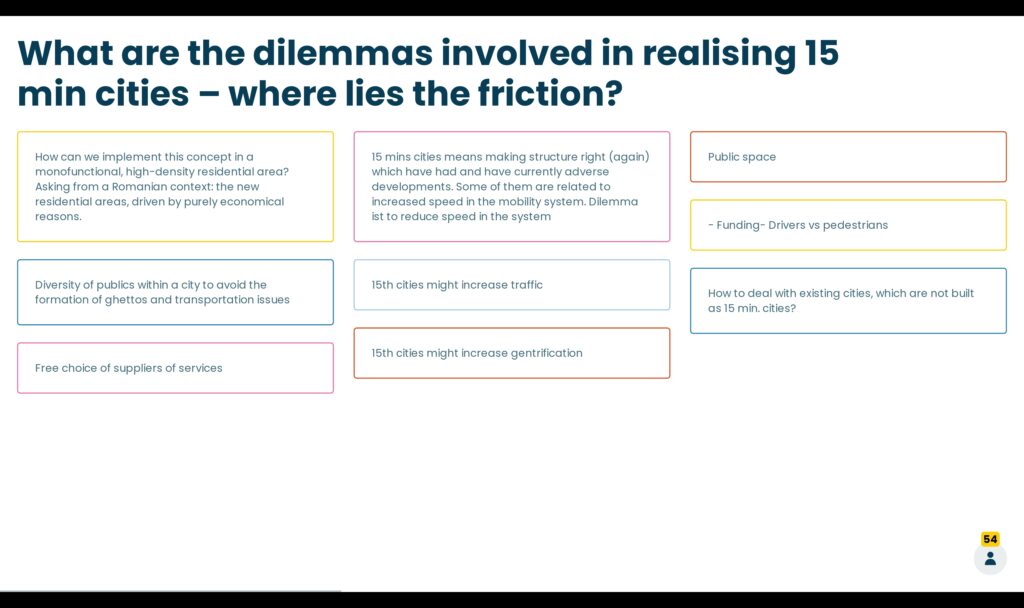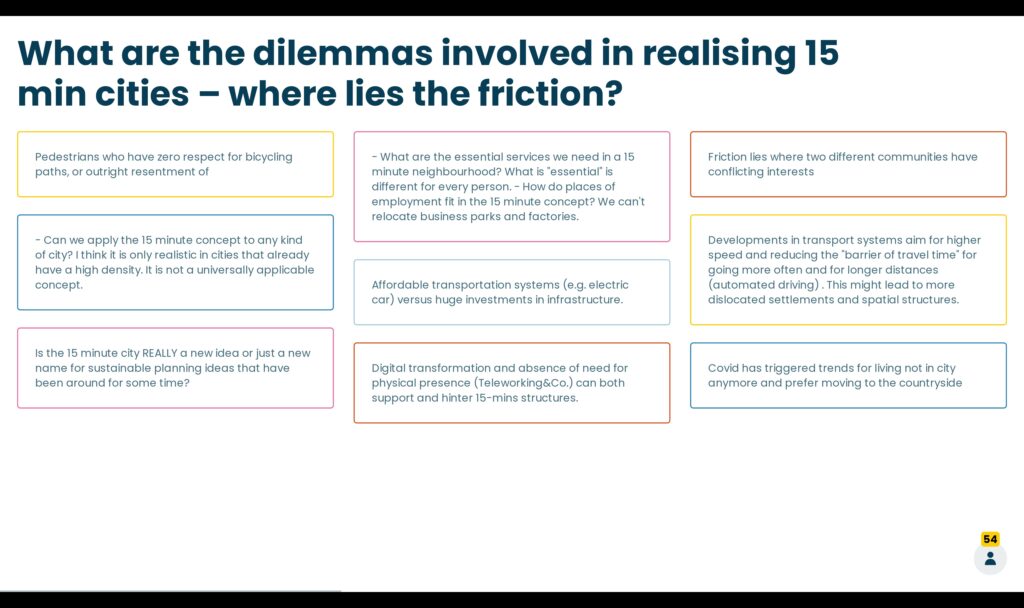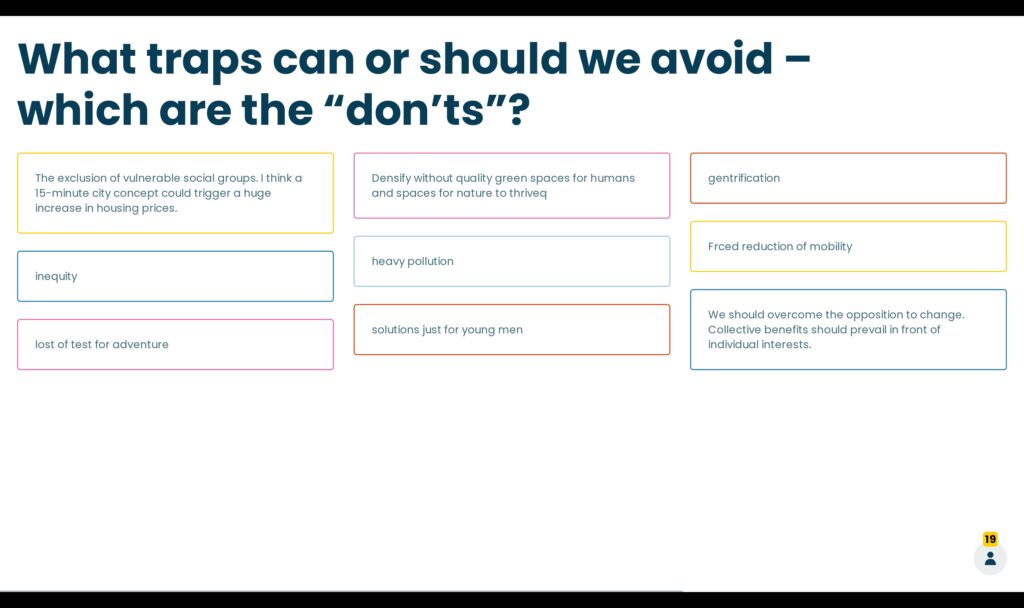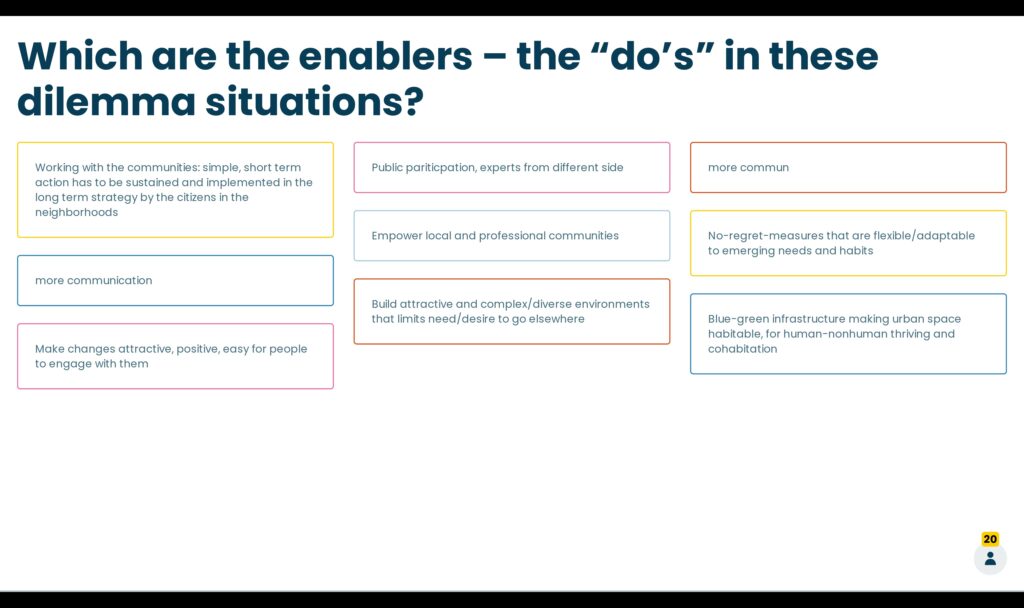
Welcome to an #UrbanLunchTalk about the 15-minute cities pillar in the partnership Driving Urban Transitions to a Sustainable Future (DUT). To this talk, each invited guest brings one dilemma, one “do” and one “don’t” to the table – with regards to realising 15 min cities. Participants are welcome with their input via Menti. Attendees will be invited to JPI Urban Europe’s Slack channel for further self-organised exchange after the talk.
You are currently viewing a placeholder content from YouTube. To access the actual content, click the button below. Please note that doing so will share data with third-party providers.
Speed presentations
>> Slides by Guntram Geser, the SimpliCITY project
>> Slides by Giuseppe Mella, City of Venice
>> Slides by Angela Muth from the project OptiMaaS
Menti results
15-minute cities – Rethinking the Urban Mobility System and Space
Concepts for the 15 Minute City are gaining traction throughout Europe and the world. Amplified by urban vulnerabilities and weaknesses which have been highlighted by the COVID-19 pandemic, rethinking urban areas along the principles of the 15 Minute City has been illustrated as one central pathway towards sustainability and liveability. The 15 Minute City is one priority of the upcoming Driving Urban Transitions Partnership which JPI Urban Europe is currently designing. The partnership proposes to follow the vision of the 15-minute city as a way towards a holistic, people-oriented, and challenge-driven perspective for the redesign of urban mobility and planning.
Facing the climate crisis, we need to take action now and cannot wait longer to find “perfect solutions”. Instead, taking measures into implementation and practice must be at the top of the list. Although many technological solutions to drastically lower GHG-emissions already exist, the institutional and regulatory surrounding is often lagging or simply not in place yet, thus blocking a shift towards sustainable individual behaviour.
But it isn’t that simple. Everyone who is somehow involved in city development knows about the wicked issues that emerge from strategic decision making in this context. In a changing, interconnected and hyper-complex environment urban practitioners and strategists often encounter dilemmas; having to decide between two or more alternatives that seem equally desirable or undesirable. Dilemmas occur where the level of uncertainty is too high to rely on a pre-calculated action plan.
- What are the dilemmas involved in realising 15 min cities – where lies the friction and the conflict of trade-offs?
- What traps can or should we avoid – what are the “don’ts”?
- Which are the enablers – the “do’s”?
Meet the guests
- Guntram Geser works with the SimpliCITY project, supported in the JPI Urban Europe call Making Cities work. SimpliCITY explores digital services and incentive design for smart sustainable communities. The project boosts the digital competences of the urban communities in Salzburg, Uppsala and three follower-cities in living a sustainable lifestyle. One aim is to raise awareness for a “sustainable city lifestyle” and increase the number of engaged urban citizens by developing methods and tools for nudging a community towards the consumption of regional sustainability services (RSUS). Focus is on bike mobility services, local production and consumption and digital inclusion services.
- Angela Muth from tbw research (AT) is the project leader of the project OptiMaaS: Optimized Mobility as a Service – Holistic mobility solutions for the urban periphery. OptiMaaS is too part of the Making Cities Work call and aims at reducing hurdles for implementing better multimodal, environmentally friendly mobility services in the urban periphery and improving the social acceptance of Mobility as a Service (MaaS) offers. MaaS-Systems are traffic services including public transport in combination with other transport modes (taxi, car-sharing, bike-sharing etc.). This combination is facilitated using IT-Platforms that bundle existing mobility offers.
- Giuseppe Mella is a senior officer of the European Policies Department of the City of Venice, Italy. He is the project and communication manager of European projects in the field of international cooperation (Asia Urbs with China and India), RTD and innovation (FP6, FP7, Horizon2020, Interreg IV C, Urbact), sustainable mobility (Alpine Space, Interreg), environment (IEE) and culture (Culture 2007-2013, Creative Europe).
- Dr. Nina Mostegl works at the Salzburg Institute for Regional Planning and housing in the Energy and Climate department as an interdisciplinary smart city expert. She advises and manages the Smart City Initiative of the city of Salzburg for which she develops and coordinates (national and international) implementation projects, organizes (local and national) information and awareness-raising events and supervises the general Smart City dissemination activities to achieve the energy and climate targets outlined in the Masterplan 2025. Further, together with her SIR colleague Helmut Strasser, she manages the Smart Cities Network Austria, an exchange platform for the seven largest cities in Austria, which aims to support and accelerate innovation processes in cities and strengthens joint learning. In this context, she is also involved in the national consultation process of the Fit4UrbanMission – a research program of Austrian climate ministry that specifically targets cities and aims to support them to participate in the Horizon Europe Mission “100 Climate-Neutral Cities by 2030” and to start the transformation process towards climate neutrality.
- Johannes Riegler (host) is the Stakeholder Involvement Officer in JPI Urban Europe and manager of the AGORA – JPI Urban Europe’s Stakeholder Involvement Platform to build capacities to co-creating pathways for urban transitions. He also works with matters of internationalization beyond Europe and the conceptual work around urban living labs. Johannes is an urbanist and geographer and conducted his studies in Brussels, Vienna, Copenhagen, Madrid, Budapest and Klagenfurt.
———————————————————————————————————–
This event is part of JPI Urban Europe’s series of Urban Lunch Talks around the pillars (areas of priority) in the Driving Urban Transitions to a Sustainable Future (DUT) partnership.
> Previous Urban Lunch Talks
> More events
> AGORA Thematic Dialogue | Pathways towards 15MinuteCities





